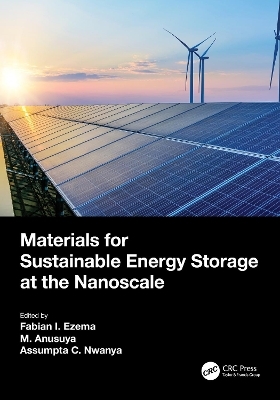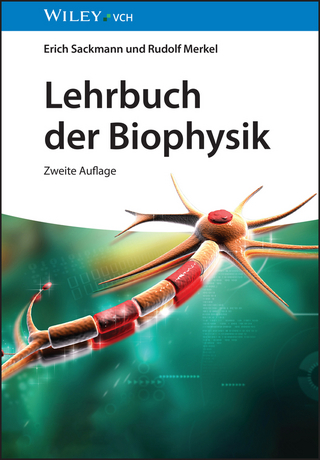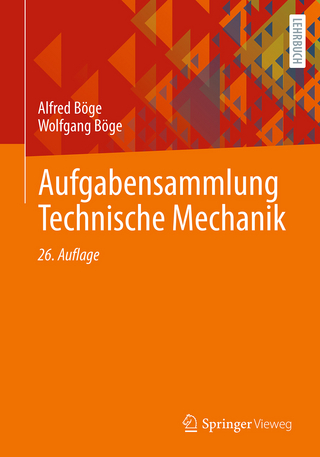
Materials for Sustainable Energy Storage at the Nanoscale
CRC Press (Verlag)
978-1-032-41004-3 (ISBN)
- Lieferbar (Termin unbekannt)
- Versandkostenfrei
- Auch auf Rechnung
- Artikel merken
The book Materials for Sustainable Energy Storage Devices at the Nanoscale anticipates covering all electrochemical energy storage devices such as supercapacitors, lithium-ion batteries (LIBs), and fuel cells,
transformation and enhancement materials for solar cells, photocatalysis, etc. The focal objective of
the book is to deliver stunning and current information to the materials application at nanoscale to
researchers and scientists in our contemporary time towardthe enhancement of energy conversion and
storage devices. However, the contents of the proposed book, Materials for Sustainable Energy Storage
at the Nanoscale, will cover various fundamental principles and wide knowledge of different energy
conversion and storage devices with respect to their advancement due to the emergence of nanoscale
materials for sustainable storage devices. This book is targeted to be award-winning as well as a reference
book for researchers and scientists working on different types of nanoscale materials-based energy
storage and conversion devices.
Features
Comprehensive overview of energy storage devices, an important field of interest for researchers worldwide
Explores the importance and growing impact of batteries and supercapacitors
Emphasizes the fundamental theories, electrochemical mechanism, and its computational view
point and discusses recent developments in electrode designing based on nanomaterials, separators,
and fabrication of advanced devices and their performances
Fabian I. Ezema is a professor at the University of Nigeria, Nsukka. He earned a PhD in Physics and Astronomy from the University of Nigeria, Nsukka. His research focused on several areas of Materials Science, from synthesis and characterizations of particles and thin-film materials through chemical routes with emphasis on energy applications. For the last 15 years, he has been working on energy conversion and storage (cathodes, anodes, supercapacitors, solar cells, among others), including novel methods of synthesis, characterization and evaluation of the electrochemical and optical properties. He has published about 180 papers in various international journals and given over 50 talks at various conferences. His h-index is 21 with over 1500 citations and he has served as reviewer for several high impact journals and as an editorial board member. Dr. M.Anusuya, M.Sc., M.Phil., B.Ed.,Ph.D. is specialized in Material science, Thin Film Technology, Nano Science, and Crystallography. She is working as a Registrar of Indra Ganesan Group of Institutions, Trichy, Tamilnadu, India. Earlier to this, she served as a Vice-Principal at Trichy Engineering College, Trichy, Tamilnadu, India.. Being an administrator and teacher, with more than 25 years’ experience, for her perpetual excellence in academics she has been recognized with many awards. She has received over 45 awards in Academic and Social Activity. She has published more than 30 research papers in National and International journals, 7 chapters in edited books, 5 patents, presented 50 papers in the conferences and organized more than 200 webinars, both national and internationally. Dr Assumpta C. Nwanya is a Lecturer and a FLAIR (Future Leaders - African Independent Research) Scholar at the Department of Physics and Astronomy, University of Nigeria, Nsukka. She obtained her PhD in 2017 (University of Nigeria, Nsukka) with specialisation in the synthesis of nanostructured materials for applications in photovoltaics and electrochemical energy storage (batteries and supercapacitors) as well as for sensing. She was a Postdoctoral Fellow under the UNESCO-University of South Africa (UNISA) Africa Chair in Nanoscience and Nanotechnology (2018-2020). She is a research Affiliate with the SensorLab, University of the Western Cape Sensor Laboratories, Cape Town, South Africa. Dr Nwanya is a very active researcher and has published more than 85 scientific articles in high impact journals and has a Google Scholar’s H-index of 24 and 1475 citations.
Chapter 1 Prediction and Optimization of Inter-Pulse Tungsten Inert Gas (IP-TIG) Arc Welding Process Parameters to Attain Minimum Fusion Zone Area in Ti–6Al–4V Alloy Sheets Used in Energy Storage Devices.
Chapter 2 Structural and Morphological analysis of Drying Kinetics of Photovoltaic Thermal (PV – T) Hybrid Solar Dryer for drying of Sweet Potato Slices
Chapter 3 Armchair Carbon Nanotube Magnetoflexo Thermoelastic Mass Sensor with Non-Linear Vibration on an Elastic Substrate
Chapter 4 Atomic Layer Deposition (ALD) Utilities in Bioenergy Conversion and Energy Storage
Chapter 5 Manufacturing of Buckypaper Composites for energy storage applications - A review
Chapter 6 Synthesis of Graphene/Copper oxide nano composites for super capacitor applications
Chapter 7 Nano Carbon Materials Based Solar cells
Chapter 8 Bio-derived Nanomaterials for Energy Storage
Chapter 9 A Conceptual Approach to analyze the behavior of nano materials for hydrogen storage
Chapter 10 Investigation of Nano Materials – An Energy Storage and Conversion Devices
Chapter 11 Nano materials for Supercapacitors
Chapter 12 Aspects of Nanotechnology applied in the energy sector: A Review
Chaper 13 Synthesis of Graphene-based Nanomaterials from Biomass for Energy Storage
Chapter 14 Distributed Optical Fiber Sensing System for Leakage Detection in Underground Energy Storage Pipelines Using Machine Learning Techniques
Chapter 15 Influence of Nano materials on the Ionic Conductivity and Thermal Properties of Polymer Electrolytes for Li+ ion Battery Application
Chapter 16 Prospective Materials for Potential Applications in Energy Storage Devices
Chapter 17 Food waste mixed with carbon nanotechnology for energy storage
Chapter 18 A Facile Microwave Assisted Synthesis of Nanoparticles in Aspect of Energy Storage Applications
Chapter 19 A Critical Review on Role of Nanoparticles in Bioenergy Production
Chapter 20 Copper oxide nanoparticles for Energy Storage Applications
Chapter 21 Enhanced thermal energy effectiveness in storage, conversion, and heat transfer utilizing Graphene-Based Devices
Chapter 22 Nanomaterials in Energy Storage - Groundbreaking Developments
Chapter 23 Prospects of Graphene and Mxene in Flexbile Electronics and Energy Storage Systems – A Review
Chapter 24 Pan Based Composite Gel Electrolyte For Lithium Ion Batteries
Chapter 25 High Gain Modified LUO Converter for Nano Capacitor Charging
Chapter 26 Nanotechnology in Solar Energy
Chapter 27 Nano-composites for Energy Storage
Chapter 28 Development of Environmental Benign Nanomaterials for Energy and Environmental Applications
Chapter 29 ZnS nanoparticles for High Performance Supercapacitors
Chapter 30 Cost Effective Mediated Fabrication of ZnO Nanomaterials and its Multifaceted Perpsective Towards Energy Storage and Environmental Applications
Chapter 31 Nanotechnology for Sustainable Energy Storage Devices in Medical applications
Chapter 32 Nano technology in Batteries for Hybrid Renewable Energy Storage Systems
Chapter 33 Biocompatible Nano-Electromechanical System based Cantilever - An Overview
Chapter 34 Eco-friendly for Sustainable Nanomaterials for Renewable Energy Storage
Chapter 35 Nanomaterials in Solar Energy Applications
Chapter 36 Carbon Nanomaterials for Energy Storage
Chapter 37 Green Energy Storage Devices Using Nanocellulose
Chapter 38 Synthesis of Graphene Nanomaterials for Energy Storage Applications
Chapter 39 Electrical Energy Storage Analysis of Li4Ti2O6 Nanomaterials by Sol-gel method
| Erscheinungsdatum | 08.03.2024 |
|---|---|
| Zusatzinfo | 32 Tables, black and white; 154 Line drawings, black and white; 38 Halftones, black and white; 192 Illustrations, black and white |
| Verlagsort | London |
| Sprache | englisch |
| Maße | 178 x 254 mm |
| Themenwelt | Naturwissenschaften ► Physik / Astronomie ► Angewandte Physik |
| Technik ► Elektrotechnik / Energietechnik | |
| ISBN-10 | 1-032-41004-3 / 1032410043 |
| ISBN-13 | 978-1-032-41004-3 / 9781032410043 |
| Zustand | Neuware |
| Haben Sie eine Frage zum Produkt? |
aus dem Bereich


